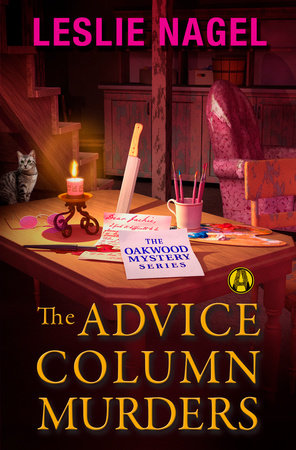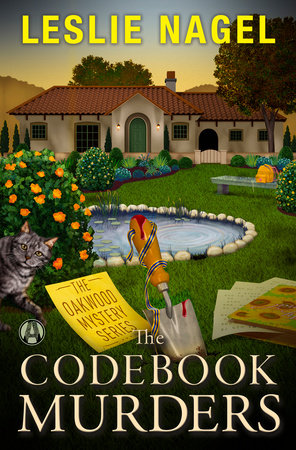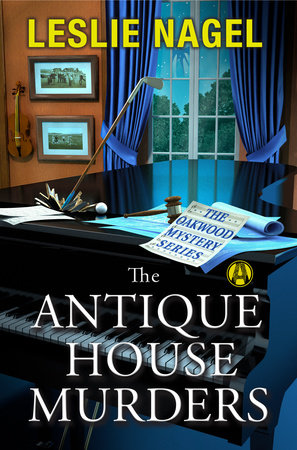Excerpt
The Advice Column Murders
Chapter 1
She felt like death warmed over.
Charley Carpenter stood in the pretty green and white bedroom at her home on Hawthorn Boulevard, her eyes closed as she willed the pain relievers she’d taken to start tackling her insomnia-induced headache. Yet another night of tossing and turning had left her dry-eyed and exhausted. She was currently nursing a pounding head, a stiff neck, and a sour mood.
Part of her—a big part—wanted nothing more than to crawl back under the covers and let this day muddle along without her. If she hadn’t felt certain she’d have no more luck falling asleep with daylight streaming in her windows than she had during the cool, soft night, she might have succumbed to temptation. But with two business meetings this morning, lollygagging was not an option, no matter how lousy she felt.
Suck it up, Carpenter.
With a sigh of resignation, she reached for her vintage seventies patchwork leather jacket, only to discover it had become oddly dense since she’d laid it on the window seat. She tugged gently on the sleeve, and the jacket shifted with a life of its own.
“You little stinker. Are you trying to play stowaway?” Charley reached inside and pulled out a silver tabby kitten. It tried valiantly to hang on to its hiding place, burying needle-sharp claws into the satin lining. She unhooked them one at a time, then cuddled the tiny warm body against her chest. Mission accomplished, the kitten immediately snuggled in, gazing up at her with huge green eyes and purring with a volume totally out of proportion to its size.
The Carpenters’ newest family member had been rescued from a storm drain by one of Frankie Cartolano Bright’s six older brothers. Apparently all the Cartolanos were dog people, so out went the call to adopt. Her best friend since seventh grade, Frankie knew Charley’s weaknesses all too well. One purr and she had been toast.
“Sorry, Hercules,” she said to the creature she’d named after her favorite fictional detective, Dame Agatha Christie’s Hercule Poirot. “No car rides today.”
As she gathered up her jacket and prepared to head downstairs, the sound of shouting had her turning back to the window.
“Not again.” Frowning, she gazed out and to her left toward the house next door, where a red-faced Dr. Paxton Sharpe strode across his front lawn. He climbed into a late-model Mercedes, revved the engine, and shot backward out of his driveway at a shallow angle that caused the left rear tire to strike the curb of the grassy boulevard that bisected their quiet street. Charley’s frown deepened as Sharpe slammed the car into drive and roared off.
“We’ve got children on this street, jerk face,” she muttered at his dissipating exhaust cloud. “Two of them are yours.”
When old Mr. Schmidt fell and broke his hip last summer and moved into assisted living, everyone had expected to see a for sale sign appear in the front yard of the white house with blue shutters where he and his late wife had lived for more than forty years. After sitting empty for several months, the house had finally been occupied—but as a rental. Just before Christmas, Sharpe, his wife Judith, and their four-year-old twins, Henry and Phillip, had moved in.
Charley’s father, Bobby, was saddened to see one of his last contemporaries from the neighborhood moving away. Still, they had all looked forward to having a new family right next door. Unfortunately, the Sharpes had demonstrated exactly zero interest in establishing friendly relations with anyone. Lawrence Whittman, Bobby’s live-in caregiver and the unofficial mayor of Hawthorn Boulevard, had wasted no time in running over with baked goods and an invitation to dinner. With minimal civility, Judith had accepted the cookies but declined the invitation. The platter had appeared the next day on the Carpenters’ front porch, unwashed, with no note.
As the young daughter of a single father, Charley had eaten a lot of cookies at the Schmidts’ over the years, doing her homework and watching Mrs. Schmidt make homemade peach kuchen, while Charley’s widowed dad was busy coaching UD Flyer football. She’d always believed this was one of the best things about living in Oakwood, the way neighbors befriended and helped one another. Apparently, the Sharpes didn’t appreciate that sense of community.
They also didn’t seem to appreciate that population density meant everyone could hear you when you screamed at one another. Thanks to the current spell of warm weather, Charley had been sleeping—or rather, trying to sleep—with her windows open. This wasn’t the first time she’d heard Paxton unloading on his poor wife and kids. Yesterday he’d come home after ten p.m. and started bitching about a cold dinner and toys underfoot. This morning’s tirade had sounded like a money dispute. Not that Charley was trying to eavesdrop, but it was difficult to ignore an argument practically right outside your window.
Lawrence had managed to glean from another neighbor that Dr. Sharpe was actually Lieutenant Colonel Sharpe, a thoracic surgeon stationed at the military hospital on nearby Wright-Patterson Air Force Base. Before promotion to chief of surgery at Wright-Pat, he’d served two tours in the Middle East, patching up wounded and training local medical personnel in Western surgical techniques. Charley had read about veterans returning home and struggling with PTSD. Perhaps, she thought, allowances needed to be made. She only hoped Paxton was getting the help he needed, for the twins’ sakes, if not his own.
She carried the kitten downstairs and into the kitchen, where Lawrence and Bobby were drinking coffee and devouring a freshly baked apple crumb cake. She kissed her father’s cheek and placed Hercules in his lap. No stranger to this location, the kitten promptly curled up and fell asleep.
“My girl looks tired. No sleep again?” Bobby asked. Bright blue eyes alive with love and intelligence searched her face. Despite the three strokes that had confined him to a wheelchair, the man missed very little, particularly when it came to his only daughter.
Charley pulled a travel coffee mug out of a cupboard and filled it to the brim. “I think it’s the change of seasons. It’ll pass.” Lawrence snorted and mumbled something, and Bobby chuckled. She turned and glared at them.
“Something on your mind, gentlemen?”
“Nope.” Lawrence popped a forkful of cake into his mouth. “I’m sure you’re right. Couple of days, you’ll be right as rain. Say, by Thursday? Friday, latest.” Both men sported huge grins, one lopsided due to stroke damage, one blinding white in a handsome face the color of polished walnut. Partners in crime, she thought with a mixture of fondness and irritation. Knowing better than to encourage these two scoundrels, Charley decided not to dignify Lawrence’s opinion with a response.
“I’ll be back at nine-thirty for the staff meeting.” She pointed a finger at a blissfully oblivious Hercules. “I’m leaving you in charge. You boys behave.”
Charley slipped on her jacket, grabbed a slice of cake, and, with a final wave, headed out to tackle the day. When she stepped onto her front porch, she stopped dead. For a full minute she simply stood and breathed.
“Now this,” she murmured, “is how to cure a headache.”
After a brutally cold, gray winter that left everyone exhausted and grumpy, springtime had finally come to Oakwood, Ohio. Crocuses and forsythias bloomed. Everywhere delicate flowers and tender greenery emerged to brighten the gardens and boulevards. There’d been plenty of April showers, but today was picture-postcard perfect, sun sailing across a deep blue sky dotted with puffy clouds. A soft breeze caressed Charley’s face, stirring a few stray wisps of curling red hair that had escaped her ponytail.
As she slowly descended steps flanked by terra-cotta pots overflowing with gold and white pansies, she felt her spirits rise. Yellow daffodils and tiger-striped tulips bloomed in a double row across the front of the Carpenter home, a cheerful splash of color against the dark red brick. She and Lawrence had had such fun planting them last September. Bobby had sat on the porch enthroned in his wheelchair like a benign ruler overseeing his subjects, happily directing operations and basking in the sunshine.
She glanced next door. There were no signs of life in the wake of Paxton’s angry exit scene. Thank goodness the yelling had stopped. The tension emanating from the Sharpe household was palpable. This thought suddenly brought to Charley’s mind a nearly forgotten encounter with another member of that demonstrably unhappy family.
Five days ago, well after dark, she’d been standing in her front yard, just as she was now. The balmy evening had drawn her outside, where she’d hoped—in vain, as it turned out—to quiet her body and spirit enough for sleep. Eyes closed, surrounded by the layered darkness of streetlamps and moonlight filtering through branches still thinly clad in this first week of April, she began the measured breathing exercises she’d learned in John Bright’s martial arts classes. There was no sound except for the occasional passing car, a voice calling in the family dog from a distant back porch, the murmur of the wind.
“I know who you are.”
Charley almost jumped out of her skin. She whirled around, heart pounding, her eyes probing the shadows. A figure stood motionless near the steps of the house next door.
“Hello? Who’s there?”
When the speaker stepped forward, light from the nearest streetlamp revealed a slender woman with shoulder-length brown hair and a pale, square face. Despite the mild evening, she wore a heavy, long-sleeved brown wool dress, thick cotton tights, and a brown cable-knit cardigan. She had her arms wrapped around her body as if she were freezing. Charley put her age at about thirty. Her looks were not exactly pretty, but it was a face you’d remember, she thought, especially once you noticed her remarkable bicolored eyes. Heterochromia, if she remembered her high school biology. The woman drew closer, staring back at Charley.
“You’re the girl who helps catch murderers.”
Charley was taken aback. While her various exploits had received some local media coverage, she’d never considered the possibility that people she didn’t know might actually know her. Upon consideration, that was a foolish, and possibly dangerous, misconception. In this day and age, there was no such thing as privacy.
She crossed her yard and extended a hand. “Charley Carpenter. I’m afraid you have me at a disadvantage. Are you a friend of Paxton and Judith?”
“Sarah Weller.” A thin, icy hand clasped Charley’s briefly and was quickly withdrawn. “I’m visiting my mother. And my . . . half siblings.” Her mouth twisted. “Paxton is no friend of mine.”
Charley was unsure how to reply to this rather extraordinary statement. “Well,” she ventured lamely, “you certainly have lovely weather for your visit.”
“I have an online subscription to the Oakwood Register. Do you help other people, or just the police?”
“Help people?” Charley was even more disconcerted. “I’m not sure what you mean.”
Sarah didn’t answer right away, instead staring at Charley with an intensity that bordered on the manic, an impression magnified by her unusual eyes. One brown, one hazel, they bored into Charley’s gray ones. Sarah’s expression became distressed, almost angry, as if she were fighting some internal battle. Seconds ticked by in silence that grew taut as a bowstring.
“Sarah?” Charley asked at last, keeping her voice low. “Do you need help? Are you in some sort of trouble?”
As Sarah opened her mouth to reply, a sharp command cut across the evening, issued by a harsh female voice that sounded none too happy.
“Sarah! Where are you!?!”
The spell was broken.
Sarah’s lips tightened, and she took a deliberate step back. “That’s my mother. Good night.” She turned and ran into the house. The door slammed behind her, leaving Charley staring in astonishment. After a few minutes of standing alone in the dark, she’d shrugged off the odd encounter and returned to her bed, where she’d tossed and turned until dawn. She hadn’t given Sarah Weller another thought.
Until now. What was Sarah’s story? Do you help other people? She’d clearly been on the verge of asking Charley for help. But help with what? She’d promised herself she would get Sarah alone and find out what was on her mind. Now, four days later, she was a bit ashamed to admit that she’d completely forgotten about Sarah Weller and her hypothetical problems. Blame it on the insomnia, she thought.
And also on the fact that she hadn’t seen Sarah again. Strange, although her comment about Paxton hadn’t boded well for a pleasant family reunion. Perhaps Sarah had already left.
According to the ever-resourceful Lawrence, there was also a young man in temporary residence, a son of Paxton’s from a previous marriage. Brandon Sharpe attended a military academy. Oakwood’s spring break had come and gone, but she supposed private schools ran on their own schedules.
Charley hadn’t caught so much as a glimpse of Brandon since his arrival a few days ago. She wondered what he did all day. Sleep? Perhaps he helped Judith with the twins. Perhaps he had already gone back to school. Perhaps having all those visitors under his roof was the reason for Paxton’s recent displays of temper.
Perhaps the Sharpes and their houseful of half and step-siblings are none of your business, Charley admonished herself, shaking off her reverie and checking her watch. She needed to get it in gear.
As she turned toward the street, she stilled. A prickle of unease crawled across her scalp. Something born from deep within a primitive part of her brain, the part that had schooled her cave-dwelling ancestors in the ways of survival, was broadcasting a very clear message. Danger! Run! Get away! Since she was not a Neanderthal, but a modern, stubborn woman, Charley stood her ground. Was something wrong? Or was her overactive imagination playing tricks?
Experience had taught her to pay attention to her instincts, so she began examining her surroundings in detail, seeking out potential threats. Her eyes scanned up and down the street, taking in the houses, the boulevard, the spreading oak tree in her front yard, all the familiar elements of a well-known, beloved scene she’d been looking at her entire life. Nothing was amiss, at least that she could see.
Across the street, the Douglas girl was out walking the family schnauzer before leaving for school. Four doors down, Mrs. Grant’s old hatchback pulled carefully out of her driveway. She had an hour’s drive to her manufacturing job in Mason and liked to beat the traffic. Birds sang, squirrels scolded and chased one another. All perfectly normal.







